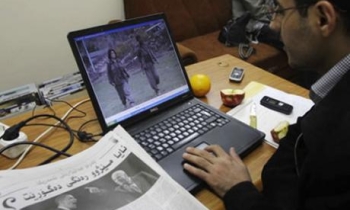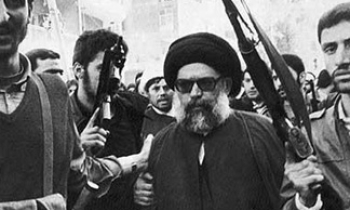Hundreds of members of the radical pro-government Young Patriots militia seized control of the state television and radio broadcaster Radiodiffusion Télévision Ivoirienne (RTI) Wednesday, broadcasting calls for protests against the French and UN presence in the country, according to local sources. They were also said to ransack a community radio station that refused to allow them on the air.

The Young Patriots, who are loyal to President Laurent Gbagbo, had surrounded RTI's headquarters on Monday in an effort to gain access to its studios, according to the sources. The militia members finally succeeded this morning, despite the presence of government security forces. Those sources said the security forces did not appear to make any effort to halt the Young Patriots. Independent observers consider RTI a public service broadcaster with a professional news operation.
The Young Patriots held control of the station throughout the day, broadcasting repeated messages directing supporters to specific spots for demonstrations, including RTI, UN headquarters, and the French embassy. Large crowds of demonstrators formed at each place during the day.
In the central town of Daloa, the Young Patriots broke into community broadcaster Radio Tchrato-Daloa, smashed and looted equipment, forcing it off air, according to local sources. The station, run by the local authorities in Daloa, had refused to broadcast Young Patriots' messages calling for attacks on the UN base in Daloa. Security forces had been informed of threats to the station but were not present at the time of the attack, a source in Daloa told the Committee to Protect Journalists (CPJ).
"It is outrageous that the Young Patriots are able to terrorise the media and spread dangerous propaganda in this way," CPJ Executive Director Ann Cooper said. "We urge President Gbagbo to do everything in his power to halt these violent attacks on the media."
Protests broke out on Monday after international mediators recommended the dissolution of parliament, whose mandate has expired. Gbagbo's Front Populaire Ivoirien (FPI) withdrew from the transitional government in protest, and called for UN and French peacekeepers to leave the country. Protests escalated on Wednesday as UN peacekeepers came under attack from the Young Patriots in the west of the country. Several protestors died, and the UN forces pulled out of their base in Guiglo.

According to Reuters Alertnet, until the 1990s, Ivory Coast was a model of prosperity and peace, and the top cocoa grower in the world. Ruled by the powerful southerners since independence in 1960, however, tensions between the north and the south had been brewing for some time, and a coup in 1999 exposed deep divisions along ethnic, political, and religious lines.
Claims of discrimination seemed to be born out when opposition politician Alassane Ouattara, a Muslim from the north, was excluded from the October 2000 election which propelled Gbagbo – a Christian from the south – to office. Ouattara was barred from the race on grounds that he is a foreigner, a charge he denies. Anyone whose parents were not born in Ivory Coast is considered foreign, and Ivorian law limits the political rights of residents who do not have 100 percent Ivorian heritage.
An attempted coup in 2002 generated a rash of nationalist movements that targeted Muslims, northerners and West African immigrants, many of whom work on cocoa and coffee farms, and harkened back to former President Henri Konan Bedie’s concept of a true Ivoirite, or Ivorianness. Nearly one million West African immigrants in the south fled their homes for fear of their lives.
France presided over a power-sharing agreement signed in January 2003, which was meant to create a "government of unity", but distrust and suspicion abounded on both sides. In September 2003, the main rebel group, calling themselves New Forces (FN), pulled out of the government, accusing President Gbagbo of disingenuousness and intentionally delaying implementation of the peace agreement.
Since 2000, when President Gbagbo took over in flawed elections, the government has increasingly relied on militias for law enforcement and, following the 2002 coup attempt, to combat the rebellion, says Human Rights Watch. The militias are used by the government and pro-government regional officials to violently suppress opposition demonstrations and political party activity, and to muzzle the press.

Gbagbo canceled the October 2005 elections, blaming the rebels in the north of refusing to disarm. The UN and the African Union later endorsed a one-year extension of Gbagbo's five-year mandate, despite fierce objections from rebels and the opposition.
The warring sides chose a new prime minister, Charles Konan Banny, to shepherd the country toward elections within a year. He named a new 32-member national unity government December 2005 composed of rebel, opposition and ruling party ministers.
The violence threatens to derail what has been a fragile ceasefire since 2003 maintained by nearly 7,000 UN troops and police and 4,000 French soldiers. UN Secretary-General Kofi Annan has called on Gbagbo's government to halt "orchestrated violence directed against the United Nations". The European Union also condemned the rioting.
This is not the first time that RTI has come under attack at a time of national crisis. In November 2004, pro-government forces seized control of the broadcaster and used radio and television to incite hostility toward foreigners and Ivoirian ethnic groups deemed sympathetic to the rebels. Violent clashes ensued. The United Nations condemned the broadcasts. The government reinstalled station management in January 2005.
"History is repeating itself because the calls for military protection for the state media were not heeded," Reporters sans Frontières (RSF said. "Côte d'Ivoire's state media have again fallen into the hands of the proponents of violence, and no time should be lost in taking energetic measures. The installations of RTI and RCI should be made secure or, failing that, they should be taken off the air."









